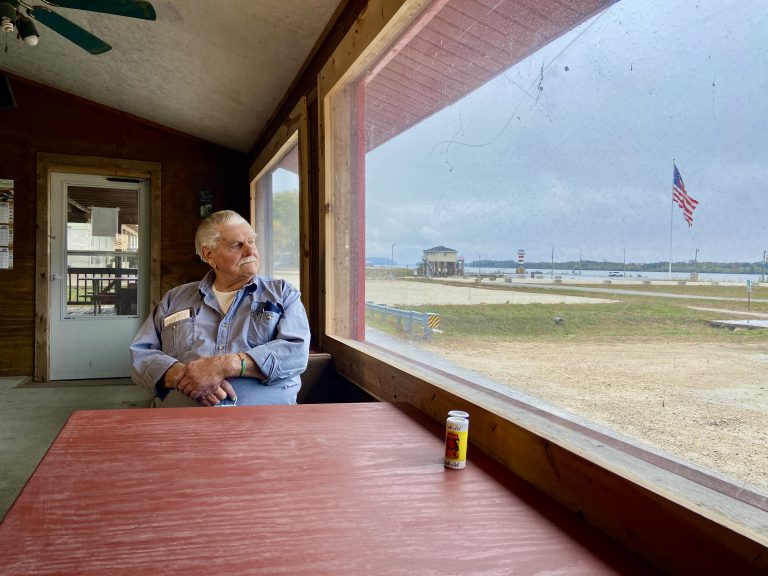Scientists say climate change is already here, and it’s causing more frequent storms and flooding. Illinois Newsroom’s Lecia Bushak traveled to Grafton, where the Illinois and Mississippi Rivers come together to see how the town is still dealing with the physical and mental health effects of a devastating flood in 2019.
GRAFTON – In the spring of 2019, snow, rain and remnants of a tropical storm caused the Mississippi River to overrun its banks. Eight foot high floodwaters rose to the roofs of homes and businesses in downtown Grafton — a small town of about 650 people in southwestern Illinois. Residents and business owners were forced to evacuate.
Grafton Mayor Rick Eberlin remembers it well.
“It was very traumatic,” he says. “It was very unnerving I guess you could say. This flood lasted for 125 days, so it was the longest flood that this region has ever experienced.”
The damage wasn’t limited to homes and roads; it also took a toll on mental health.
“It was a very emotional time,” Eberlin says. “To see the looks on people’s faces every time rain was in the forecast or every time you’re out working and you hear it thunder. I can remember seeing a business owner, pretty tough guy, never saw a whole lot of emotion out of the individual, just break down.”

Research shows that natural disasters are linked to mental illness like post-traumatic stress disorder or PTSD, anxiety and depression.
“The more and more of these types of events that happen, the more and more people are going to be exposed to pain and threat,” says Dr. Ted Bender, a psychologist and president of UnityPoint Health in Peoria. “And the more and more people that get exposed to pain and threat, the more people will develop mental health disorders that need to be treated.”
But it’s often difficult for the survivors of disasters to find the mental health treatment they need.
A recent survey out of the Center for Public Integrity and Columbia Journalism Investigations found that among U.S. regions hit hard by wildfires, hurricanes or floods, 70% of survivors reported not receiving mental health services in the aftermath of the disaster. And more than 60% of respondents reported experiencing five or more types of emotional challenges in the first year following the disaster.
The Federal Emergency Management Agency (FEMA)’s main way of addressing mental health needs is through its Crisis Counseling Assistance and Training Program, or CCP. Typically, CCP grants are provided after a presidential disaster declaration, and can last either 60 days or nine months.
According to the Center for Public Integrity, this short-term relief fund often reaches only a small portion of disaster survivors, and funds treatment for about a year, despite the fact that mental health effects can last much longer.
Grafton received a FEMA disaster declaration in the fall of 2019. But it did not receive CCP or any aid for mental health services.

Dan Bechdel’s furniture store saw seven feet of water when the floods hit Grafton last year, resulting in what he says was “the loss of everything.” He says the stress of having to face another flood weighs heavily on him.
“It is very much a mental strain because you’re worried about your livelihood being gone,” Bechdel says. “And at this age, I don’t want to start over. I’m too old to start over.”
Eighty-one-year-old Oliver Reedy has lived in Grafton his entire life and owns O’Jan’s Fish Stand near the river, which experienced major damage during the 2019 floods.
“I’ve been in [floods] ever since I was a kid,” Reedy says. “But it never was this bad. These are the kinds of floods that hurt people.”
He says the flooding in Grafton has gotten worse over the course of decades, and he believes it’s due to climate change.
“There’s gotta be some changes coming. Some people might not think so, but there is,” Reedy says. “If they don’t watch what they’re doing in the next 30 years, I’m afraid there won’t be much of it left.”

Colin Wellenkamp, Executive Director with Mississippi Rivers Cities and Towns, says the number of disasters along the Mississippi River—including in states like Iowa, Illinois and Missouri—is indeed increasing.
“It used to be that these events were spaced out every 25 to 30 years,” Wellenkamp says. “You’d have a major event every couple of decades. Now, we have a major event that breaks records the next year.”
He says the accumulation of frequent natural disasters places a greater strain on mental health.
“Emphasizing intervention and prevention for the impacts of mental illness and emotional support are absolutely necessary and we definitely need to ramp that up,” Wellenkamp says.
Slowly, with the help of funds from FEMA, Grafton is rebuilding its businesses and infrastructure. While they wait on more mental health care in the region, the residents in the meantime have to rely on their own resilience.
Lecia Bushak is a reporter at Illinois Public Media. Follow her on Twitter.







